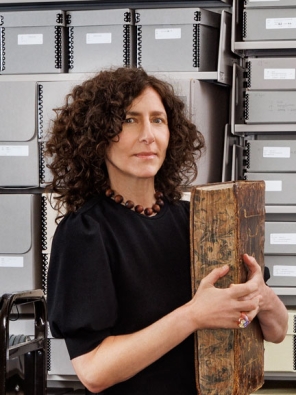Collections Policy
The Collection Development policy furnishes general written guidelines that relate the library’s collection-development efforts to the needs and interests of the Middlebury community.
As of January 2025, this policy is in the process of being updated. Not all of the content here reflects current practice. If you have a question about our current collections policies, contact Julie Adamo, Director of Collection Strategies and Acquisitions (contact information below).
General Collection Policy
Because it is Middlebury’s chief provider of books, maps, serials, government documents, microforms, bibliographic databases, and other materials, the library’s central purpose is to support first the teaching and learning activities that uphold the curriculum, and second the research and service responsibilities of Middlebury.
Middlebury College Profile
Middlebury College is principally an undergraduate, liberal arts institution of higher learning; its mission is to ensure that student educational experiences in the liberal arts are both broad and deep. The College offers students a curriculum that exhibits wide representation of academic disciplines, and privileges classroom teaching over scholarly research, although it supports both endeavors aggressively.
Selection Responsibilities
The library has responsibility for developing the collection, with ultimate responsibility for the selection of materials belonging to the Dean of the Library. Academic faculty and students are an important source of requests for the purchase of library materials, and the library strongly encourages College community members to participate in this process and suggest a library purchase.
Faculty Reimbursement for Library Purchases
On occasion, faculty may have the opportunity to purchase library materials, particularly when traveling abroad. In order to be reimbursed, faculty must get permission from the Collection Development Librarian before proceeding with these purchases. In general, only items that have been requested through the Collection Development Librarian but have proven difficult or impossible to obtain should be purchased in this manner. Itemized receipts are required by the Controller’s Office for reimbursement.
Types of Materials
- Monographs
For print, hardbound editions usually are purchased for the humanities and paperbound for the sciences and social sciences. The library also acquires electronic books. - Journals/Serials
The Library subscribes to journals and newspapers as well as other serials in appropriate subject fields. Electronic format is preferred, and duplicate subscriptions are avoided whenever possible. Requests for new subscriptions and periodical backfiles are reviewed on a case-by-case basis by Library staff. - Electronic Resources
The library provides access to a variety of electronic information resources available locally and over the internet. Requests for new purchases or subscriptions are reviewed on a case-by-case basis by Library staff. - Dissertations and Theses
Dissertations and theses are treated as specialized research materials and are acquired only to support senior thesis research. Requests must have the support of a faculty member. -
Textbooks
The library generally does not add textbooks to the collection, and is unable to purchase copies of every required textbook. Attempting to do so would quickly consume a significant portion of its materials budget and its available shelving space.Textbooks may be acquired under specific circumstances:
- If they represent significant contributions to the presentation of a subject or if there is a scarcity of other material in the field, or
- If faculty request that textbooks be purchased for placement on reserve. The strong preference will be for electronic editions allowing access by simultaneous multiple users. When such editions are not available or are unreasonably expensive, the library will consider purchasing up to two print copies for physical reserves. These copies will be retained in the collection for three years after their last placement on reserve.
- Duplicates
The purchase of multiple copies is discouraged, as the Library is not a direct provider of books required for classes. A later edition of a monograph already in the collection is acquired only when the new or revised material justifies its purchase. Depending on the nature of the new edition, older editions may be withdrawn from the collection. - Faculty authors
The Library collects books written by, or with contributions by, Middlebury College faculty. We selectively collect works by visiting faculty, instructors at the Bread Loaf School of English, the Language Schools, and the Middlebury Institute of International Studies at Monterey (MIIS). If you have a publication that we have accidentally overlooked, please let us know and suggest a library purchase. - Government Documents
The Library is a depository for United States documents and collects State of Vermont documents. Government documents are housed in the main library and are available to the general public. Please read the Government Documents Collection Development Policy for more information. - Software
Software usually is purchased not by the Library, but by individual departments and by Academic Computing. Exceptions are made on a case-by-case basis, as when a software package accompanies a book or when a software package supports an academic program but does not qualify for departmental or Academic Computing support. - Film/Video
These materials are selected primarily for research or instructional purposes. The library does not rent films, nor does it generally purchase exhibition rights to such material. The library does purchase some materials for recreational viewing. Formats include streaming media and assorted varieties of optical discs as available. Because streaming media titles are not always available for outright purchase, the library can often only license titles for limited periods (one year is a common term). - Audio
Musical recordings are purchased to support the teaching, learning, and research missions of the College, as well as to support recreational listening. Please refer to the Music Collection Policy for more detail.
Deselection and Withdrawal
Deselection is a consultative endeavor between librarians and members of the faculty aimed at enhancing the value, utility, and relevance of the holdings. Librarians routinely undertake deselection to allow space for new and needed materials. In some subject areas, material has historical significance for great lengths of time, while in others, materials need to be updated after a shorter period. Whenever possible, the process of deselecting or cancelling journals is done collaboratively by librarians and members of the faculty. Titles no longer relevant to current needs, unused, or not appropriately accessible by electronic means will be identified as candidates for cancellation.
Gifts
All gift materials accepted by the Library become the property of the College, and the Library reserves the right to determine retention, location, and disposition. See our gift policy for further details.
Music Collection Policy
This policy outlines the written guidelines for the continued growth and maintenance of Middlebury College’s music collection and is a supplement to the Middlebury College Library Collection Development Policy. By articulating the collection goals and policies, this document helps to ensure that the music collection supports the needs of the College community. The policy acknowledges the music collection’s distinct roles in the following:
- Supporting the teaching, learning, and research objectives of the Music Department
- Providing campus-wide resources for music in cultural context within and across other academic disciplines
- Supporting productions in related arts departments (especially the Theatre and Dance Departments)
- Providing listening pleasure for the College community
Objectives
- To acquire all library materials necessary for instructional and research purposes in the teaching of Western art music, jazz, musical theater, traditional, popular and world music at the undergraduate level.
- To develop a strong reference collection designed to assist individuals in locating materials necessary for their research and information needs and to prepare students who may continue with graduate work in music.
- To develop a collection of performance materials for all vocal ranges and for each instrument of the orchestra with an emphasis on chamber works, piano music, and musical theater, excluding collections of parts for large ensembles.
- To develop a music collection in various formats that fulfills human needs for artistic expression and recreation including a representation of popular music (including jazz, blues, “world music,” etc.).
- To acquire music materials that will enhance the study of foreign languages and cultures represented in the Middlebury College curriculum.
Types and formats of materials collected generally
- Significant books on music aimed at the educated layperson and undergraduates, including biographies, criticism, interviews, and histories of music.
- Significant contributions to the music reference literature, including thematic indexes, bibliographies, dictionaries, and encyclopedias.
- Periodicals on music history, theory, musical genres, and music performance, preferably in online format.
- Study-sized orchestral scores, piano-vocal opera and musical scores, chamber music scores and parts for up to nine players; significant variant editions of standard repertoire; major art song repertoire in all available voice ranges. Urtext editions and other editions reflecting current scholarship are strongly preferred.
- Sound recordings on compact disc or online of Western art music, jazz, musical theatre and popular music, world music (especially recordings in languages taught by Middlebury), including recordings for recreational use by the College community. Older formats such as LPs, cassettes, and 78s are not collected.
- Video recordings, principally DVDs or online video streaming (if a viable option), of significant performances, particularly of opera, musicals and other works with a strong visual component; feature films with substantial music content or focusing on key eras, styles, or performers in music history; documentaries of especial significance.
- For musical works new to the collection, the library will attempt to purchase both scores and recordings; for dramatic or multi-media works, the library will also attempt to purchase video recordings.
- Locally produced sound recordings of music, theatre, and dance, featuring Middlebury College students, staff, and faculty.
- Materials on dance as selected by the Library Liaison to the Dance Department.
Types of materials collected selectively
- Monographic studies of composers’ works, theoretical studies, music pedagogy and instruction, discographies, textbooks, workbooks, dissertations and theses, Festschriften, conference proceedings, anthologies of essays by multiple authors, foreign-language periodicals.
- Methods and studies for applied performance pedagogy for all instruments and musical genres taught by the Music Department.
- Scholarly reference sets (i.e., monuments).
- Full-size orchestral scores, full (i.e., not piano-vocal) opera and musical scores.
- Scores of solo vocal commercial works; score manuscript facsimiles, rare materials, early editions and numbered editions, fakebooks, popular song folios.
- Sound recordings of variant performances of important works, reflecting artistically significant performances and a diversity of performance styles; anthologies for music appreciation.
- Video recordings of documentaries and pedagogical material; concert films (especially classical repertoire).
Types of materials not collected (unless required for specific curricular needs)
- Abstruse scholarly works intended for specialists.
- Multiple copies of items (unless required due to high use).
- Foreign-language dissertations.
- Pamphlets and ephemera.
- Single or discrete issues of periodicals.
- Parts for orchestra, band or jazz band.
- Sheet music.
- Multiple copies of choral works for choral performance.
- Multiple scores for in-class analysis of works.
- Arrangements by other than the original composer in score for other than the original instrument.
- Microforms.
Deselection and Withdrawal
The library follows the guidelines in the Library Collection Development Policy for deselection and withdrawal of materials.
Gifts
The Library may accept gifts of music materials that adhere to the guidelines in this policy. Music materials are accepted with the understanding that the College becomes the owner of the materials and reserves the right to determine their retention, location, and disposition. Please see our gift policy for further details.
Special Collections and Archives Policy
Middlebury Special Collections collects and preserves rare and unique materials that support the interdisciplinary research, teaching, and learning of our undergraduate and graduate students and our faculty. Middlebury faculty are an important source of requests for the acquisition of rare materials. Contact Rebekah Irwin, Curator and Director of Special Collections to learn more.
The College Archives collects and preserves materials documenting the activities of administrators, students, faculty, and staff. It serves as an educational resource for the Middlebury Community and beyond. View full College Archives Collection Development Policy on their site.
Contact
Rebekah Irwin
Interim Dean, Middlebury College Library; Director and Curator, Special Collections & Archives
- Email:
- rirwin@middlebury.edu
- Tel:
- (802) 443-3028
- Office:
- Davis Family Library 250G
Julie Adamo
she/her
Director, Collection Strategies and Acquisitions
- Email:
- jadamo@middlebury.edu
- Office:
- Davis Family Library 135D
Terry Simpkins
Director, Discovery & Access Services
- Email:
- tsimpkin@middlebury.edu
- Tel:
- (802) 443-5045




